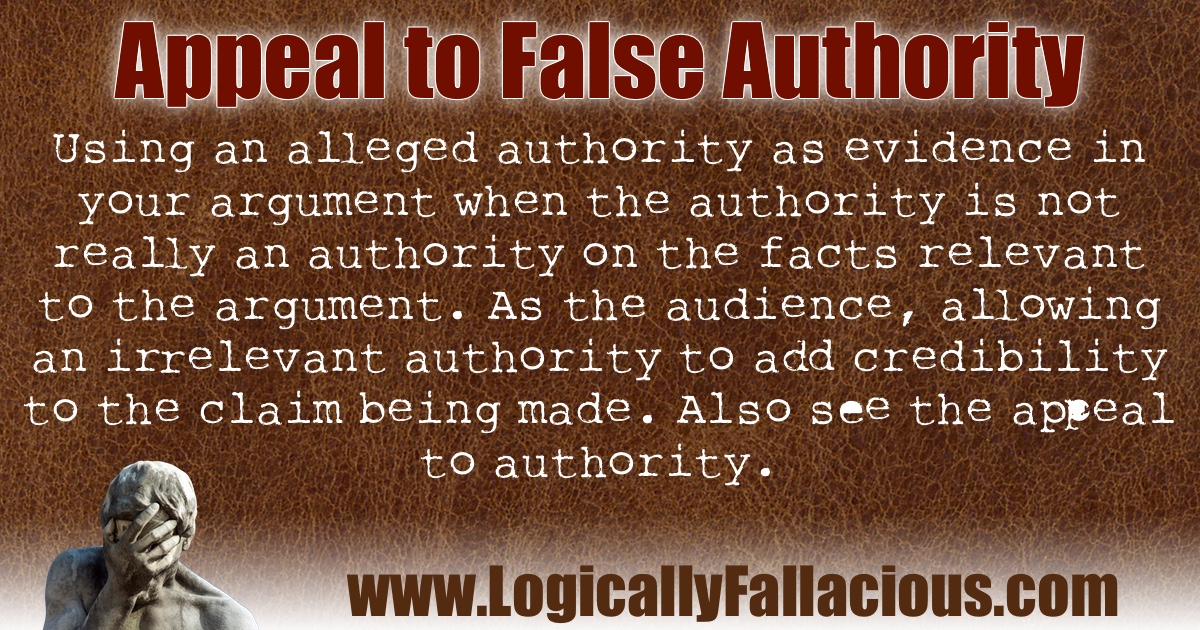(also known as: appeal to doubtful authority, appeal to dubious authority, appeal to improper authority, appeal to inappropriate authority, appeal to irrelevant authority, appeal to misplaced authority, appeal to unqualified authority, argument from false authority)
Description: Using an alleged authority as evidence in your argument when the authority is not really an authority on the facts relevant to the argument. As the audience, allowing an irrelevant authority to add credibility to the claim being made. Also see the appeal to authority.
Logical Forms:
According to person 1 (who offers little or no expertise on Y being true), Y is true.
Therefore, Y is true.
According to person 1 (who offers little or no expertise on Y being true), Y is true.
Therefore, Y is more likely to be true.
Expert A gives her view on issue B.
Expert A’s area of expertise has little or nothing to do with issue B.
Expert A’s opinion influences how people feel about issue B.
Example #1:
My 5th-grade teacher once told me that girls would go crazy for boys if they learn how to dance. Therefore, if you want to make the ladies go crazy for you, learn to dance.
Explanation: Even if the 5th-grade teacher were an expert on relationships, her belief about what makes girls “go crazy” for boys is speculative, or perhaps circumstantial, at best. In other words, the teacher's expertise is in dance, not on the psychology of attraction.
Example #2:
The Pope told me that priests could turn bread and wine into Jesus’ body and blood. The Pope is not a liar. Therefore, priests really can do this.
Explanation: The Pope may believe what he says, and perhaps the Pope is not a liar, but the Pope is not an authority on the fact that the bread and wine are actually transformed into Jesus’ body and blood. After all, how much flesh and blood does this guy Jesus actually have to give?
Example #3:
Dr. Dean, TV’s hottest new psychologist, says that coffee enemas are the “fountain of youth.” Get me that coffee enema!
Explanation: Assuming Dr. Dean is actually a licensed psychologist, that does not qualify him to give advice about non-psychology related issues such as coffee enemas. Like the colon, Dr. Dean is most likely full of... obligate anaerobes. Extending his expertise from psychology to issues of the colon is fallacious.
Example #4:
My accountant says that within the next 90 days, the president will be impeached! So we should take this claim seriously!
Explanation: Unless the accountant has some inside information to the presidency, her expertise in accounting has little to do with the current administration, political, and constitutional law.
Exception: Don’t pigeonhole people into certain areas of expertise. A medical doctor can also be an expert in sewing. A fly-fisherman can also be an expert in law. And a patent clerk can also be an expert in quantum mechanics.
Tip: Beware of your confirmation bias. You may want a person to be an authority on the topic, and this desire will result in your seeking out confirming information and ignoring conflicting information.

References:
Hume, D. (2004). An Enquiry Concerning Human Understanding. Courier Corporation.